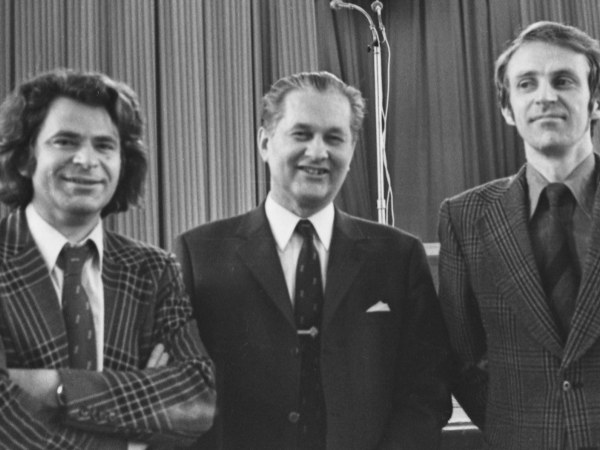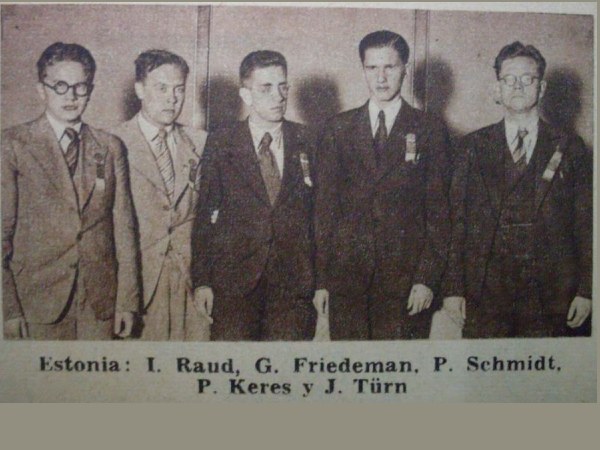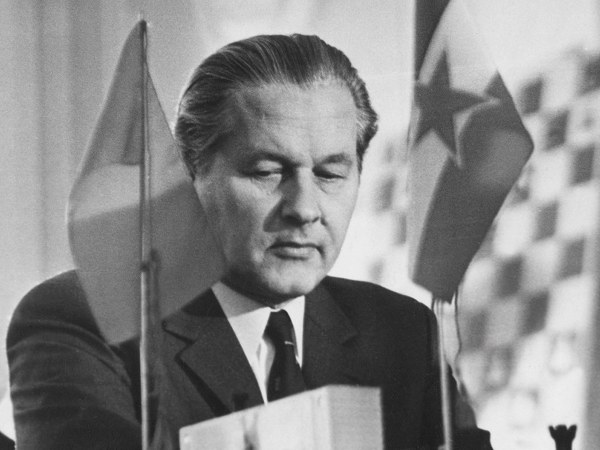Paul Keres, born 7th January 1916 – died 5th June 1975. A capricorn!
The talent of Keres was great and it soon was noticed. Here's a report by International Master Vladas Mikenas: "In 1928 I visited Pärnu where I played a simul. During the simul a dark-haired, 12-year old boy demanded my whole attention. I always had to stop at his board for a long time to think. But in vain, all my attempts to save the game failed. The boy received the deserved applause and asked me modestly whether we could play some blitz games. I left Pärnu with the firm conviction that I had played with a player who would once be a star among the very best."
"I learnt chess quite early. I was not yet five years old when my brother and I were allowed to watch how my father played chess against the service personnel. We did not know yet that you can write games down. After we had discovered chess in magazines and books I acquired a thick notebook in which I kept my notes to openings and hundreds of master games. At this time I started with correspondence chess, and sometimes played 150 correspondence games simultaneously. In 1929, when I was about 13 years old, I won the Estonian Junior Championship." Paul Keres
When he was 18 years old Keres won the Estonian Championship. 1935, 1937, 1939 – Chess Olympiads. With Keres Estonia has a very strong player who also scores well on first board. „A star is born“. In 1940 Stalin annexed the Baltic countries and the Estonian Paul Keres became the Soviet citizen Paul Petrovic Keres.

Paul Keres - National hero of Estonia
While writing I admiringly read Keres' collection of selected games, "The Road to the Top" and "The Quest for Perfection". Keres had an enormous number of games he could choose from. Statistics tell us that he played 1,328 tournament games (+952, =188, -188) in his career. A fascinatingly low drawing precentage. But he did not only play, he was also a renowned composer of studies. In the Soviet Union his "100 Selected Games" were published in 1966 but it also appeared in Estonian and German, and I gradually start to understand that Keres, the perennial second and six-time candidate, had been a much better chess ace than I had thought. His notes to his 100 selected games are simply World Champion level!
Amateurs very often ask me: "How can I improve my chess?" I like to reply: "Try to play your games as if you were stroking a cat. That is, from the head to the tail and never against the fur. If you also study the selected games from Keres' book and manage to master 150 correspondence games simultaneously - as he did - your rating will soon rise considerably."
I feel flattered because Keres included the game Hort-Keres – European Championship, Oberhausen, 1961 (No 91) into his collection of games. I remember that my opponent was dressed like a fashion model. He was shaved to perfection, fragranced and was wearing a classic suit with tie and tie-pin. His German was perfect. He calmly wrote down the moves in elegant handwriting and long notation. When I was in time-trouble he remained a gentleman and did not hammer the clock like mad.

Oberhausen 1961, Hort (with white shirt). Tal and Petrosian are kibitzing.
After returning from Oberhausen my buddies in Prague greeted me with mischievous smiles. Why? Grandmaster Ludek Pachmann had mentioned the game in the Czechoslovakian sports paper, writing that "… after Keres' queen sacrifice the talented Hort fell from his chair". This sentence quickly spread in the chess scene of Prague. Which gives you an idea how successful chess anecdotes come into being.
But what happened really? Keres sacrificed his queen on move 35. After 40 moves the game was adjourned, as was common at that time. While I was thinking what move to adjourn, no less than 45 minutes, I was swinging back and forth on my chair, oblivious to time and space. Suddenly I lost my balance and crashed to the floor. As it later turned out my 41st move was losing. Keres received the brilliancy prize for this game.
In 1965, at the International Tournament in Marienbad, we met again. In the time of communism this tournament was considered to be the strongest tournament in Czechoslovakia. I had the honor to share first place with Keres.
During the Czechoslovakian Championships in Luhacovice 1969 we also played tennis. Keres and I formed a strong double. He had an excellent serve. We were complementing each other excellently and lots of enthusiastic spectators followed us.

Paul Keres was an excellent tennis player
Interzonal tournament Petropolis 1973. I could not sleep and decided to take a rather early morning walk. When I came to the pool I saw someone covered by blankets. It was Keres. We started to talk, like two good old colleagues. He could not sleep either and his current standing in the tournament made his qualification for the candidates rather unlikely. He was suffering from severe gout and he showed me his swollen joints. "Young man, I cannot concentrate at all, and it would have been better if I had not played the tournament in the first place." This statement and his suffering made me very sad.
But in 1975 the very same Keres smoothly won a strong tournament in Tallinn which the Estonian Chess Federation had organized to celebrate his 60th birthday that was soon to come. Keres himself could pick the particpants of the tournament and I was very happy when I received an invitation.
Tallinn 1975
| Rk. |
Title |
Name |
Country |
ELO |
1 |
2 |
3 |
4 |
5 |
6 |
7 |
8 |
9 |
10 |
11 |
12 |
13 |
14 |
15 |
16 |
Pts. |
Perf. |
TB |
| 1 |
GM |
Paul Keres |
|
2580 |
|
½ |
½ |
½ |
½ |
½ |
1 |
½ |
1 |
½ |
½ |
1 |
1 |
1 |
1 |
½ |
10.5 / 15 |
2476 |
|
| 2 |
GM |
Boris Vasilievich Spassky |
|
2548 |
½ |
|
½ |
½ |
1 |
½ |
½ |
½ |
0 |
1 |
½ |
½ |
½ |
1 |
1 |
1 |
9.5 / 15 |
2426 |
66.50 |
| 3 |
GM |
Fridrik Olafsson |
|
2373 |
½ |
½ |
|
½ |
½ |
0 |
½ |
½ |
½ |
1 |
½ |
1 |
1 |
1 |
1 |
½ |
9.5 / 15 |
2436 |
65.00 |
| 4 |
GM |
David I Bronstein |
|
2432 |
½ |
½ |
½ |
|
½ |
½ |
1 |
½ |
½ |
0 |
1 |
½ |
½ |
1 |
1 |
½ |
9.0 / 15 |
2409 |
64.25 |
| 5 |
GM |
Vlastimil Hort |
|
2423 |
½ |
0 |
½ |
½ |
|
1 |
0 |
½ |
½ |
½ |
½ |
½ |
1 |
1 |
1 |
1 |
9.0 / 15 |
2410 |
60.00 |
| 6 |
GM |
Aivars Gipslis |
|
2429 |
½ |
½ |
1 |
½ |
0 |
|
½ |
½ |
½ |
½ |
½ |
½ |
½ |
½ |
1 |
1 |
8.5 / 15 |
2385 |
60.25 |
| 7 |
GM |
Mark E Taimanov |
|
2386 |
0 |
½ |
½ |
0 |
1 |
½ |
|
½ |
½ |
½ |
1 |
1 |
½ |
½ |
1 |
½ |
8.5 / 15 |
2387 |
59.25 |
| 8 |
GM |
William James Lombardy |
|
2435 |
½ |
½ |
½ |
½ |
½ |
½ |
½ |
|
½ |
½ |
0 |
1 |
1 |
1 |
½ |
0 |
8.0 / 15 |
2361 |
58.00 |
| 9 |
GM |
Drazen Marovic |
|
2445 |
0 |
1 |
½ |
½ |
½ |
½ |
½ |
½ |
|
1 |
0 |
½ |
½ |
½ |
½ |
1 |
8.0 / 15 |
2361 |
57.75 |
| 10 |
IM |
Iivo Nei |
|
2369 |
½ |
0 |
0 |
1 |
½ |
½ |
½ |
½ |
0 |
|
½ |
½ |
1 |
1 |
½ |
1 |
8.0 / 15 |
2366 |
54.00 |
| 11 |
GM |
Lutz Espig |
|
2259 |
½ |
½ |
½ |
0 |
½ |
½ |
0 |
1 |
1 |
½ |
|
½ |
0 |
1 |
0 |
1 |
7.5 / 15 |
2349 |
|
| 12 |
|
Boris Rytov |
|
1621 |
0 |
½ |
0 |
½ |
½ |
½ |
0 |
0 |
½ |
½ |
½ |
|
1 |
0 |
½ |
½ |
5.5 / 15 |
2297 |
|
| 13 |
IM |
Hillar Karner |
|
2251 |
0 |
½ |
0 |
½ |
0 |
½ |
½ |
0 |
½ |
0 |
1 |
0 |
|
0 |
½ |
1 |
5.0 / 15 |
2230 |
35.50 |
| 14 |
GM |
Yrjo A Rantanen |
|
2283 |
0 |
0 |
0 |
0 |
0 |
½ |
½ |
0 |
½ |
0 |
0 |
1 |
1 |
|
½ |
1 |
5.0 / 15 |
2228 |
29.25 |
| 15 |
GM |
Levente Lengyel |
|
2293 |
0 |
0 |
0 |
0 |
0 |
0 |
0 |
½ |
½ |
½ |
1 |
½ |
½ |
½ |
|
½ |
4.5 / 15 |
2201 |
|
| 16 |
GM |
Roman Hernandez Onna |
|
2375 |
½ |
0 |
½ |
½ |
0 |
0 |
½ |
1 |
0 |
0 |
0 |
½ |
0 |
0 |
½ |
|
4.0 / 15 |
2167 |
|
All games

Spassky, Keres, Olafsson
I will never forget one evening when we sat together in his luxury villa near the woods. We slowly but surely drank his best whiskey and I tried to use the opportunity to draw some secrets from him.
He was quite happy to show me his chess compositions but when the conversation turned to politics he was silent as a grave. Instead, he told me some chess anecdotes in perfect German, for instance about his encounter with Savielly Tartakover, who asked him on the ship that brought the European chessplayers to the Chess Olympiad in Buenos Aires 1939: "Junger Mann, sind wir am Meer oder am Weniger?" (literally translated "Young man, are we on sea or on less?", a pun based on the fact that the German words "Meer" [sea] and "mehr" [more] are homonyms and sound identical).

The Estonian team in Buenos Aires 1939
Recently, Robert Hübner, who appreciates the culinary skills and literary ambitions of my wife, was visiting us. During coffee we talked about Keres' book. Hübner owns a bad German and a good Estonian translation of this book and he also thinks that Keres' comments are among the best in chess literature.
But even after 77 years we had no answer to the questions arising from the annexation of the Baltic countries. Was Keres forced to be only second? Did Botvinnik put in a good word for Keres with Stalin? A lot of Estonians did not return from Siberia. Two games from the World Championship tournament 1948 remain suspicious.
From an Estonian banknote the crown prince of chess looks at the world with a Mona Lisa smile and leaves us in uncertainty.

Paul Keres on the Estonian 5 Krooni banknote
Keres once shared some wisdom with me, curiously enough in Russian - here's the English translation: "Young man, in every position there is a move to be found - but you have to search for it!“
(Tanslation from German: Johannes Fischer)





























